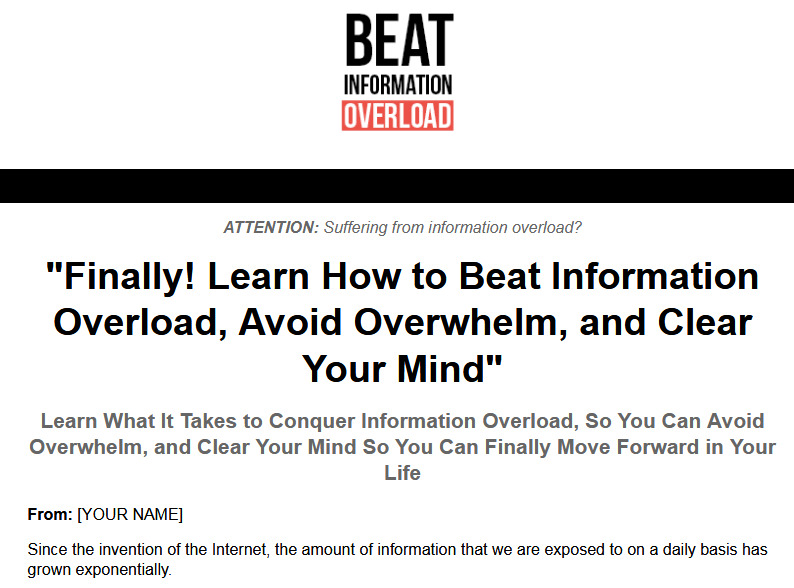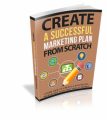Salespage Snapshot

Table of Contents
Introduction. 7
Chapter 1 – What is Information Overload . 9
The Start of Information Overload …. 11
The Onslaught of Information. 13
Chapter 2 – The Mind Under Siege.. 15
Understanding the Enemy. 16
Social Media’s Role in Information Overload… 17
Enter Social Media .. 18
A Flood of Information .. 20
Chapter 3 – Understanding the Limits of Your Working
Memory . 22
What Information Overload Does to the Brain. 24
The Limits of Working Memory…. 25
Nobody is Immune from Information Overload 27
Chapter 4 – Seeing Information as a Commodity … 28
The Information Superhighway…. 30
The Age of Conceptualization 31
Chapter 5 – Overcoming Challenges in an Information-Driven World 36
Get Everything Done …. 37
Laser-like Focus . 39
Chapter 6 – Limiting Decisions .. 43
How to Reduce Decisions . 44
Limiting Your Clothing .. 45
Limiting Your Food Choices … 46
Automate Your Shopping .. 46
Scheduling Your Evenings 47
Chapter 7 – Organizing Your Home 48
Get Ruthless.. 52
Creating Designated Rooms .. 53
Keeping Things Clean .. 54
Getting Organized … 54
Chapter 8 – Organizing Your Social Lives 57
Organizing Our Social World.. 59
Prioritize…. 61
Get Rid of Frenemies … 62
Limiting Facebook … 62
Chapter 9 – Organizing Your Time .. 65
Recognize Your Limits.. 65
Make Time to Recover . 66
Timing Your Tasks… 67
Multitasking…. 68
Closing Open Loops 69
Chapter 10 – Organizing Your Professional Life …. 71
Becoming More Productive at Work. 72
Removing Distractions.. 73
Reducing Communication Overhead 74
Conclusion 76
Sample Content Preview
Chapter 1 – What is Information Overload
Information overload is described as, an overwhelming feeling upon the receipt or collection of an indigestible or incomprehensible amount of information, the sense of being faced with an amount of data that one has no hope of completely processing, or when a person feels unable to read all the information that is presented or available to them, mainly where they need to make a decision based on that information but can’t because there is just too much to take in, in the time available. Today, thanks to the Internet and social media, we are always besieged by information regardless of whether we asked for it or not. This can best be seen in the obscene amount of junk emails that clog our inboxes daily. It can also be seen in the increasing number of sources where you can obtain information. People often interchange the word data and information. However, the two are distinctly different. Data refers to the elements or pieces of information that individually have little or no value, while information is the organization and interpretation of that data into a format that provides new insight. Information, unlike data, is directly associated with learning.
When you learn a new subject, you are implementing three simultaneous processes. First, you acquire the new information that may run counter to or replace information that you already know. Second, is the process of transformation where the knowledge gained is manipulated to make it fit new tasks. The final learning process is the evaluation of the information to ensure that it is adequate to the task. Therefore, information can be described as the acquisition of new knowledge from various sources and data elements, that when internalized can affect a difference in an individual’s previous thoughts, education, or actions. Keeping this in mind, information overload can be simply put as too much information that one can comprehend at any given time causing feelings of stress, helplessness, and anxiety.
The Start of Information Overload
You may not know this, but information overload predates the advent of the Internet and popularity of social media sites. In fact, it has a long history that dates back to 1453, when Gutenberg invented the printing press. The printing press allowed the development of new communication patterns, with information being printed and distributed by the millions instead of being copied by hand. People went from reading just a few hundred words a day to being able to read pages and pages of information. This resulted in a massive transformation in society. We can only assume that people were excited by the invention of the printing press. As a result of Gutenberg’s invention, books
became less expensive to produce, meaning they could be distributed to the masses. Books were no longer just for the select few and scholars. Symbolism and group presentation systems soon followed as a way to communicate messages. This included periodicals, associations, and new political parties. Shortly after, libraries began sprouting up everywhere as a way to organize all the new books of information.
It didn’t take long for printing presses to start printing anything that came their way to make more money, with little attention being paid to the quality of information being printed. This resulted in scholars becoming overwhelmed with the access to this knowledge, giving birth to information overload.
In recent decades, advances in information technology have evolved from using carbon paper ditto machines to photocopying. This has made replicating information more accessible and led to information being digitized and copied in limitless numbers. The digitized information has allowed for the publishing of information that was previously restricted to the printing press. The introduction of the word processor has eliminated the need for a secretary equipped with a steno pad with access to a typewriter and white-out.
Today, information has become a valuable commodity in the knowledge economy. We love information and thrive off of it. Information has become readily available with just the click of a
button and can be automatically delivered to any electronic device. Technology has helped to increase productivity and enabled people to increase their access to information. Much like the printing press, the Internet has opened our world up to a myriad of information.
Communication has become easier and quicker thanks to the advances in cell phones, smartphones, and computers, but the information we obtain from these channels can become overwhelming. With the deluge of new information formats like text messages, Twitter, cell phone, email, etc., it’s a wonder we can keep up with it all.
The Onslaught of Information
There are many reasons why people are beginning to suffer from information overload. To start, the volume of information that is available today is rising at an increasingly rapid rate. If you have a computer, you have the ability to publish content online. There are now blogs, chat forums, videos, and other communication channels where we can obtain information. Every day, an increasing amount of people are starting to participate in this age of digital information. Just on Facebook, there are more than 500 million users, with 50 percent of them logging into their account daily, spending over 700 billion minutes per month on the site, according to Facebook.
The ability to publish information is no longer limited to scholars, poets, or those who have a gift for writing. Anyone can set up a blog in mere minutes and start sharing their thoughts. As long as you have access to the Internet, publishing and sharing information can be done fairly easily, quickly, and at the simple click of a button. This makes it extremely challenging to wade through the information we’re exposed to.
While search engines like Google can help us narrow down our search and provide us with relevant results, it can still be overwhelming to try to filter through the unnecessary information. The problem now is that there is an overabundance of information on every topic imaginable. While search engines attempt to provide you with unique and relevant information first, trying to decipher the information that pertains to your need is mindboggling. Throw in social media sites like Twitter and Facebook, and you’ll find a plethora of opinions and ideas on any topic you can think of, leading to an abundance of unnecessary information. So, the question becomes, how do we manage all of this information? What can we do to prevent ourselves from becoming information addicts? Being aware that there is an issue with handling all the information is the first step. The challenge now becomes how to learn to sift through and manage the information that bombards our minds.
Chapter 2 – The Mind Under Siege
In today’s digital society, our minds are under siege. We feel this from the moment we open our eyes and pick up our smartphones until the moment we fall asleep at night. Our minds are filled with tasks to complete, dates to remember, and expectations we need to fulfill. We can’t seem to keep it all in front of us. We are constantly deluged with information that grows by the minute. The exponential growth of information we are required to absorb daily is impacting the way we work, live, and play. The rate at which our world is changing is fast and accelerating at breakneck speed, yet our minds are the same as they were thousands of years ago. Author and filmmaker, Rick Smolan states that a person in the 15th century would need their entire life to be exposed to the amount of information that the average person today experiences every day. The effects of this information overload are affecting us in ways that impact every aspect of our lives. We are experiencing more stress than ever before and a general sense of being overwhelmed.
Understanding the Enemy
Information overload is the enemy that is silently creeping up on us daily. It is changing our lives in a subtle yet dramatic way. We’ve gradually moved from a quiet simplistic world to one that is dominated by information. However, we’ve barely acknowledged this change. By examining our environment and understanding the limitations on our internal memory, we can begin to form a foundation of understanding and overcome information overload. You have to come to understand the limitations of your capabilities and establish the correct fundamental skills and techniques to overcome these limitations successfully. This will help you to reach new levels of productivity in your life. There are those among us that have quietly designed their lives based on their wishes. This creates a sense of control and calmness in today’s chaotic world. Before you can reach this sense of power and calm you have to carefully examine yourself and your limitations.
Social Media’s Role in Information Overload
Social media changed how the world communicates and shares information. Technological breakthroughs have drastically changed the way we obtain our news and information. In fact, 61 percent of people today get most of their news online.
Other Details- 20 Articles (TXT, DOC)
- 1 Ebook (PDF), 77 Pages
- 2 Graphics (PNG)
- 1 Salespage (HTML)
- 4 Promotional Ad Materials (Emails)
- Checklist, Resource Cheat Sheet, Mindmap, Optin Page, Social Media Images
- Year Released/Circulated: 2018
- File Size: 55,535 KB
License Details:
[YES] Can be sold
[YES] Can be used for personal use
[YES] Can be packaged with other products
[YES] Can modify/change the sales letter
[YES] Can be added into paid membership websites
[YES] Can put your name on the sales letter
[YES] Can be offered as a bonus
[YES] Can be used to build a list
[YES] Can print/publish offline
[YES] Can convey and sell Personal Use Rights
[YES] Can convey and sell Resale Rights
[YES] Can convey and sell Master Resale Rights
[NO] Can modify/change the main product
[NO] Can modify/change the graphics and ecover
[NO] Can be given away for free
[NO] Can be added to free membership websites
[NO] Can convey and sell Private Label Rights














